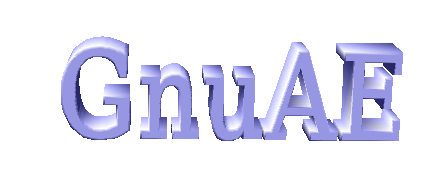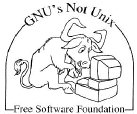

Introduction
| Get the Software |
Documentation
| Mailing Lists/Newsgroups
| Install Help
| Request an
Enhancement | Report a Bug
| Maintainer
GnuAE is also designed to make it much easier to wire for NEC code compliance without studying all 800 some pages of the NEC specification. Even for an electrician, the interdependencies between calculations is daunting. While DC wiring is much simpler than AC wiring, most off-grid household systems are both. There is even a built in NEC calculator for people that have a good feel for what they are doing, but want to also experiment with differing conduit sizes, parallel wire runs, and voltage drop.
GnuAE currently only runs on GNU/Linux & MacOSX, although some attention has been paid to eventual ports to M$ WinDoze (using cygwin). This is the initial alpha release, so your mileage may vary... I can think of a few bugs right now I need to fix before the first release. Sorry for the lame GUI, I'm not a GUI programmer, I'm more of a system hacker. Please contribute to the development of this project by helping track down bugs, or add features, or improve the GUI.
The latest gnuae development sources are available via anonymous CVS. Use the following commands to check them out (just hit return when you are prompted for the password):
I use DIA for drawing wiring diagrams. Here's an additional sheet and shapes for alternate energy systems with things like inverters, photovoltaic panels, batteries, etc. As an example, here's a wiring example based on my own system.
export CVS_RSH="ssh" cvs -z3 -d:ext:anoncvs@savannah.gnu.org:/cvsroot/gnuae co gnuae
For more detailed information on CVS usage at gnu.org, read CVS Usage at gnu.org. You can also browse the sources.
For other ways to obtain GnuAE, please read How to get GNU Software
GnuAE has three mailing lists hosted at gnu.org. Archives of these lists are stored at http://mail.gnu.org/pipermail/:
gnuae@gnu.org is for discussion of gnuae development, porting to new platforms, ideas for the future, general gnuae usage or problems. New alpha and stable releases are announced here. To subscribe, go the http://mail.gnu.org/mailman/listinfo/gnuae Volume is typically low.
bug-gnuae@gnu.org is a special list for reporting bugs, and to enable the developers to track submitted bug reports. If you think you have found a bug in gnuae, then you should, in the first instance send as complete a report as possible to this list. ideally, you should include the text you get by running config.guess, the text you see when you run configure, and if you can, a patch made with diff -u5 which fixes the problem. It will also be useful to send the logfile from the test run. To subscribe, go the http://mail.gnu.org/mailman/listinfo/bug-gnuae Volume is typically low.
gnuae-commit@gnu.org is where summaries of changes commited to the CVS repository are automatically posted. If you wish to see these changes as they happen, http://mail.gnu.org/mailman/listinfo/gnuae-commit Volume is sporadic, but typically low.
gnuae-patches@gnu.org is where the patches to the gnuae repository are posted for peer review before being commited to CVS. Send an email to gnuae-patches-request@gnu.org with subscribe as the subject line if you want to join. Volume is typically low, though individual messages can be quite large.
Announcements about GnuAE and most other GNU Software are made on <info-gnu@gnu.org>.
If you would like any new feature to be included in future versions of GnuAE, please send a request to <gnuae@gnu.org>
Please remember that development of GnuAE is a volunteer effort, and you can also contribute to its development. For information about contributing to the GNU Project, please read How to help GNU.
If you think you have found a bug in GnuAE, then you should send as complete a report as possible to <bug-gnuae@gnu.org>.
GnuAE is currently being maintained by Rob Savoye
[ English ]
Return to GNU's home page.
Please send FSF & GNU inquiries & questions to gnu@gnu.org. there are also other ways to contact the FSF.
Please send comments on these web pages to webmasters@gnu.org, send other questions to gnu@gnu.org.
Copyright (C) 2004 Free Software Foundation, Inc., 59 Temple Place - Suite 330, Boston, MA 02111, USA
Verbatim copying and distribution of this entire article is permitted in any medium, provided this notice is preserved.
Updated: $Date: 2006/11/27 00:11:08 $ $Author: rsavoye $